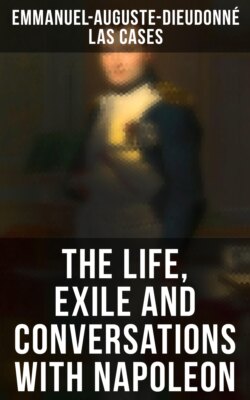Читать книгу The Life, Exile and Conversations with Napoleon - Emmanuel-Auguste-Dieudonné Las Cases - Страница 49
На сайте Литреса книга снята с продажи.
THE YOUTH OF FRANCE.—THE EMPEROR VISITS
MR. BALCOMBE’S HOUSE.
ОглавлениеTable of Contents
19th—20th. The Emperor invited my son to breakfast: it may be easily imagined that he was greatly overjoyed at this honour! It was, perhaps, the first time he had ever been so near the Emperor, or had spoken to him; and he was not a little flurried on the occasion.
The table still remained without a cloth; the breakfast continued to be brought from the town, and consisted of only two or three wretched dishes. To-day a chicken was brought: the Emperor wished to carve it himself, and to help us. He was astonished at finding that he succeeded so well; it was long, he said, since he had done so much: for all his politeness, he added, had been lost in the business and cares of his Generalship of Italy.
Coffee is almost a necessary of life to the Emperor: but here it proved so bad that, on tasting it he thought himself poisoned. He sent it away, and made me send away mine also.
The Emperor was at this moment using a snuff-box set with several ancient medals, which were surrounded by Greek inscriptions. The Emperor not being certain of the name of one of the heads, asked me to translate the inscription; and on my replying that it was beyond my powers, he laughed and said, “I see you are no better scholar than myself.” My son then tremblingly undertook the task, and read Mithridates, Demetrius-Poliorcetes, and some other names. The extreme youth of my son, and this circumstance, attracted the Emperor’s attention. “Is your son so far advanced?” said he; and he began to question him at great length respecting his Lyceum, his masters, his lessons, &c. Then turning to me, “What a rising generation I leave behind me!” said he. “This is all my work! The merits of the French youth will be a sufficient revenge to me. On beholding the work, all must render justice to the workman! and the perverted judgment or bad faith of declaimers must fall before my deeds. If I had thought only of myself, and of securing my own power, as has been continually asserted, if I had really had any other object in view than to establish the reign of reason, I should have endeavoured to hide the light under a bushel; instead of which, I devoted myself to the propagation of knowledge, and yet the youth of France have not enjoyed all the benefits which I intended they should. My University, according to the plan I had conceived, was a master-piece in its combinations, and would have been such in its national results. But an evil-disposed person spoiled all; and in so doing he was actuated no doubt by bad intentions, and with a view to some purpose.”
In the evening the Emperor went to visit our neighbours. Mr. Balcombe, who was suffering under a fit of the gout, lay stretched on a sofa; his wife and the two young ladies, whom he had met in the morning, were beside him. The masked ball was resumed again with great spirit. Our guests liberally dealt out all their store of knowledge. The conversation turned on novels. One of the young ladies had read Madame Cottin’s Mathilde, and was delighted to find that the Emperor was acquainted with the work. An Englishman, with a great round face, to all appearance a true vacuum plenum, who had been listening earnestly, in order to turn his little knowledge of French to the best account, modestly ventured to ask the Emperor whether the Princess, the friend of Matilda, whose character he particularly admired, was still living? The Emperor with a very solemn air replied, “No, sir; she is dead and buried:” and he was almost tempted to believe he was himself hoaxed, until he found that the melancholy tidings almost drew tears from the great staring eyes of the Englishman.
The young ladies evinced no less simplicity, though in them it was more pardonable: however, I was led to conclude that they had not studied chronology very deeply. One of them turning over Florian’s Estelle, to shew us that she could read French, happened to light on the name of Gaston de Foix, and finding him distinguished by the title of General, she asked the Emperor whether he had been satisfied with his conduct in the army, whether he had escaped the dangers of war, and whether he was still living.
21st.—In the morning the Admiral came to visit the Emperor. He knocked at the door; and had I not been present, the Emperor must have been reduced to the alternative of opening it himself, or suffering the Admiral to wait on the outside.
All the scattered members of our little colony, likewise, came from the town, and we were for a short time collected together. Each described the wretchedness of his situation, and received the sympathy of the Emperor.
